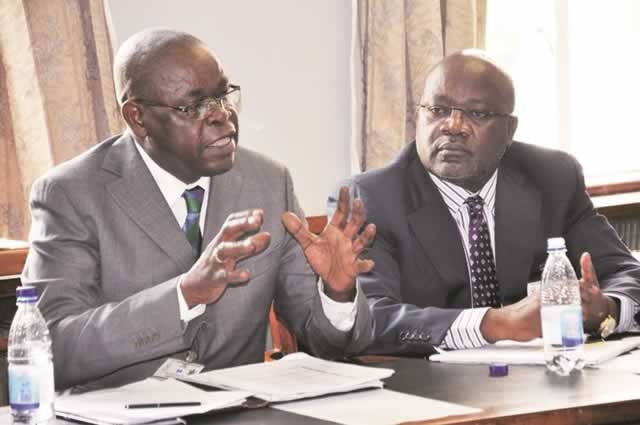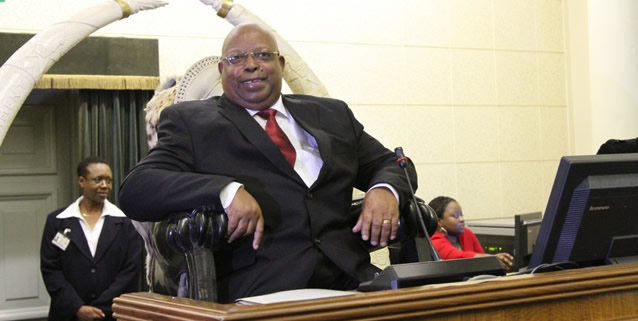The king is dead, but the monarchy lives


FROM ME TO YOU . . . Former Zimbabwe Cricket chairman Peter Chingoka (right) address parliamentarians on the state of the game in this country in the company of Wilson Manase, who last week succeeded him as leader of the game in the country
Firdose Moonda
JOHANNESBURG. — Zimbabwe Cricket’s structures have been rigorously shaken over the past few days, including the stepping down of Peter Chingoka, the chairman of 22 years, and his replacement by a non-cricket person.
Chingoka’s retirement speaks more about the loss of a figurehead than it does about any real change.
His power was diluted in later years by men with money, who worked behind the scenes, and though there are conflicting views on his role in the financial crisis that ultimately put ZC in the difficulty it currently wallows in, there is a consensus that cricket in the country has been taken out of the hands of people associated with the game and entrusted to businessmen.
The new chairman Wilson Manase is a lawyer and businessman while his deputy Maureen Kuchocha has been described by ZC as a “sports degree graduate and administrator”.
ZC has split the captaincy across formats by retaining Brendan Taylor in the Tests and promoting Elton Chigumbura to the job in limited-overs.
It has also moved national coach Andy Waller to the position of national director of coaching and asked Stephen Mangongo to take over as head coach.
Dual (or treble) concurrent captaincies are required by teams who play a lot of cricket and feel any one man would be overburdened by the task of captaining across formats, like South Africa, or teams whose Test captain does not play in some version of the game, like Australia.
Although Zimbabwe’s calendar could fill up in future, they have had just seven days of international cricket in 2014 so far — hardly enough for Taylor to feel taxed.
Relieving him of the duties in limited-overs cricket may come as a result of the team’s first three-Test series in more than 13 years looming against Bangladesh in October but, even that, is a stretch, especially given the replacement the board has chosen.
Chigumbura’s focus should lay squarely on his own game as he showed when he suffered a severe loss of form in the brief time he led the team from May 2010 to March 2011.
Given that Hamilton Masakadza is far more suited to the role, it is a mystery why Chigumbura was given the job ahead of him.
Waller was displaced on the same day Zimbabwe lost an ODI to Afghanistan and surrendered a series lead to end up sharing the spoils.
While that is disappointing enough to merit action, it comes with a year still left on Waller’s contract and less than two weeks before Zimbabwe are due to host South Africa and Australia, which could present them with a rare opportunity to get regular game time and develop consistency.
Mangongo is an experienced coach who has come through the ranks, and has even stood in as acting head coach, but he is believed to be unpopular with the players because of his approach.
He is uncompromising and short-tempered and both attributes were on display when he was involved in an altercation with a young player who refused to follow orders.
While Zimbabwean cricket’s club and school programmes need looking after, they may not need it from the man who was brought from a cushy job at a public school in England to look after the country’s elite cricketers.
If ZC wants a development officer, it should employ one.
Moving Waller sideways suggests the board no longer wants him as national coach but cannot afford to pay him out and so has created a position for him to fill while he sees out his contract. The second issue is that there are very few coaches left to groom in Zimbabwe. Over the last few months, they have lost former batting and bowling coaches Grant Flower and Heath Streak to Pakistan and Bangladesh.
They failed to renew Gary Brent’s contract and the national academy has had to make do without him as well.
ZC’s financial trouble is well documented and the current shifting sands indicate it may be trying to create a storm into which the debt can swirl along with the other issues.
If they move on, like Graeme Cremer and Kyle Jarvis have recently done, ZC will owe fewer people money and have fewer commitments to meet.
One long-suffering supporter commented that after Chingoka’s retirement, “cricket can finally start.”
Another mused, “But maybe this is where it will end.”
The king is dead. But in Zimbabwe, it’s the monarchy they have to worry about. — ESPNCricinfo









Comments